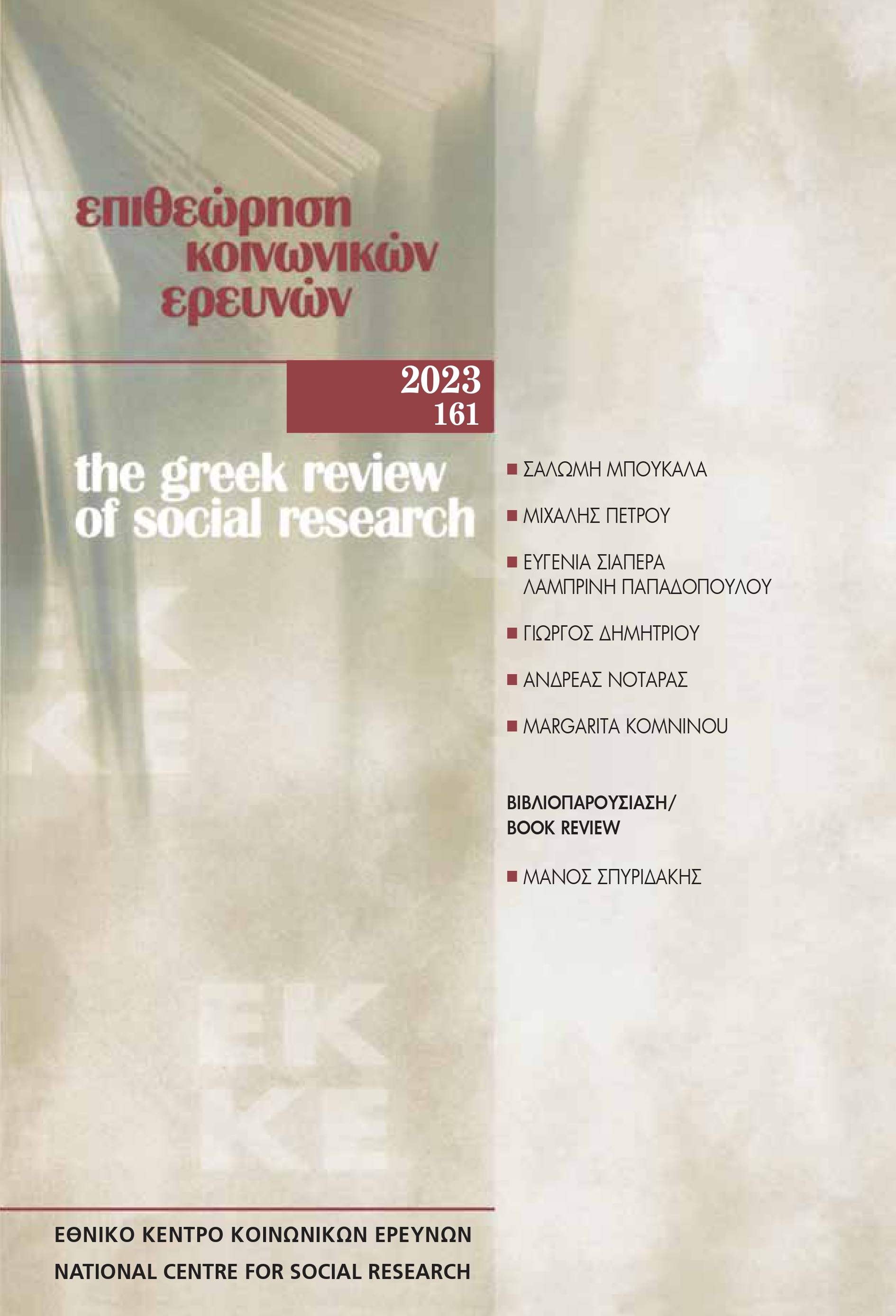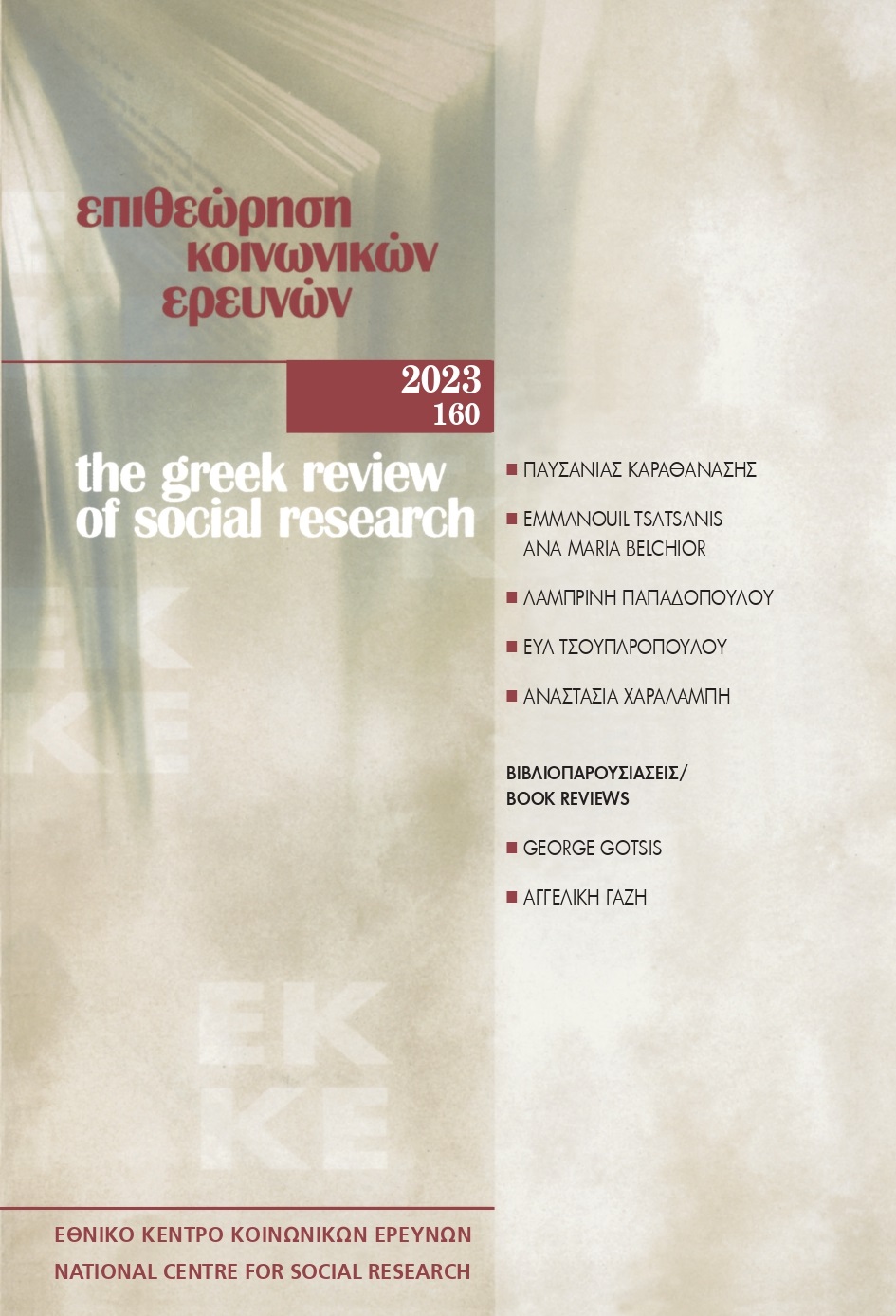Η συναισθηματική και πολιτική οικονομία της δημοσιογραφίας του μίσους: Τοξική αρρενωπότητα, μισογυνισμός και ομοφοβία στα ελληνικά ακροδεξιά ΜΜΕ

Περίληψη
Το άρθρο επικεντρώνεται στην ελληνική ακροδεξιά εφημερίδα Μακελειό και στοχεύει να καταγράψει και να αναλύσει τον τρόπο με τον οποίο αυτή παράγει και διαδίδει αρνητικά συναισθήματα όπως το μίσος. Υποστηρίζουμε ότι το Μακελειό, που αποτελεί ένα επιτυχημένο Μέσο, κατάφερε να επιβιώσει και μάλιστα να ευδοκιμήσει στο ελληνικό επικοινωνιακό τοπίο καθρεφτίζοντας, αναπαράγοντας και ενισχύοντας τις μισογυνικές και ομοφοβικές αξίες της συντηρητικής Ελλάδας. Δεν είναι τυχαίο ότι αυτού του είδους η δημοσιογραφία άνθισε κατά τη διάρκεια της κρίσης που έπληξε σοβαρά την Ελλάδα, καθιστώντας την αβεβαιότητα ως τη νέα κανονικότητα σε όλες τις πτυχές της ζωής. Αυτό το πλαίσιο λειτούργησε ως καταλύτης, που οδήγησε σε μια ευρύτερη χρήση των συναισθημάτων στη δημοσιογραφική πρακτική ως μέσο αντιμετώπισης και διαχείρισης της βαθιάς αβεβαιότητας. Ασκώντας αυτού του είδους τη «δημοσιογραφία μίσους», το Μακελειό δημιουργεί μια ιδιαίτερη σχέση με τους αναγνώστες του, οι οποίοι αναγνωρίζουν τη δική τους γλώσσα, τις σκέψεις και τις ηθικές αξίες στις σελίδες του. Εντέλει, το Μακελειό κινητοποιεί το μίσος προς τις γυναίκες και τους ομοφυλόφιλους για να προσελκύσει το κοινό του, το οποίο, με τη σειρά του, υποστηρίζει αυτού του είδους τη δημοσιογραφία καταναλώνοντάς την.
Λεπτομέρειες άρθρου
- Πώς να δημιουργήσετε Αναφορές
-
Σιαπέρα Ε., & Παπαδοπούλου Λ. (2023). Η συναισθηματική και πολιτική οικονομία της δημοσιογραφίας του μίσους: Τοξική αρρενωπότητα, μισογυνισμός και ομοφοβία στα ελληνικά ακροδεξιά ΜΜΕ . Επιθεώρηση Κοινωνικών Ερευνών, 161, 73–93. https://doi.org/10.12681/grsr.35010
- Τεύχος
- 2023: 161
- Ενότητα
- Άρθρα

Αυτή η εργασία είναι αδειοδοτημένη υπό το CC Αναφορά Δημιουργού – Μη Εμπορική Χρήση 4.0.
Οι συγγραφείς των άρθρων που δημοσιεύονται στην Επιθεώρηση Κοινωνικών Ερευνών διατηρούν τα δικαιώματα πνευματικής ιδιοκτησίας επί των άρθρων τους, δίνοντας στο περιοδικό το δικαίωμα της πρώτης δημοσίευσης. Άρθρα που δημοσιεύονται στην Επιθεώρηση Κοινωνικών Ερευνών διατίθενται με άδεια Creative Commons 4.0 και σύμφωνα με την άδεια μπορούν να χρησιμοποιούνται ελεύθερα, με αναφορά στο/στη συγγραφέα και στην πρώτη δημοσίευση για μη κερδοσκοπικούς σκοπούς.
Το Εθνικό Κέντρο Κοινωνικών Ερευνών διατηρεί το δικαίωμα να δημοσιεύει, να αναπαραγάγει, να παρουσιάζει στο κοινό, να διανέμει και χρησιμοποιεί άρθρα που δημοσιεύονται στην Επιθεώρηση Κοινωνικών Ερευνών σε οποιοδήποτε μέσο και μορφή είτε μεμονωμένα είτε ως μέρη συλλογικών έργων, για όλο τον χρόνο διάρκειας προστασίας της πνευματικής ιδιοκτησίας και για όλες τις χώρες του κόσμου. Αυτό περιλαμβάνει ενδεικτικά και όχι αποκλειστικά το δικαίωμα δημοσίευσης των άρθρων σε τεύχη της Επιθεώρησης Κοινωνικών Ερευνών, αναπαραγωγής και διανομής μεμονωμένων αντιγράφων των άρθρων, αναπαραγωγής ολόκληρων των άρθρων σε άλλη έκδοση του Εθνικού Κέντρου Κοινωνικών Ερευνών, καθώς και αναπαραγωγής και διανομής των άρθρων ή περίληψης αυτών με χρήση πληροφορικού συστήματος αποθετηρίου.



